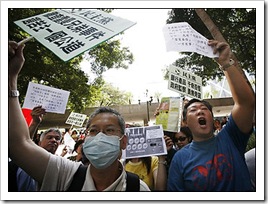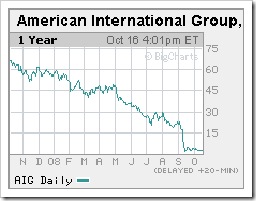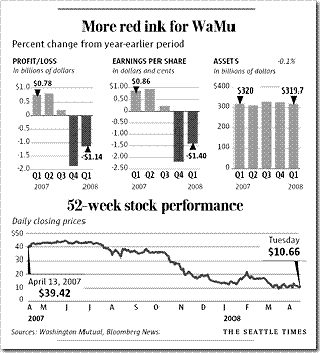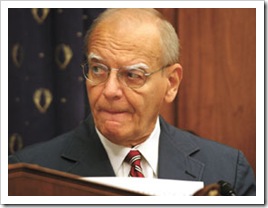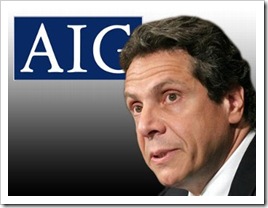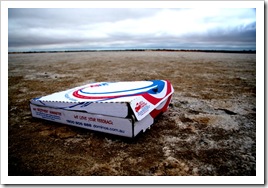Federal investigators are looking into the decline and fall of Washington Mutual Bank, and it seems they won't have to go far for a wealth of allegations as to the causes, or source material on those accusations.
Three class-action lawsuits, consolidated into one, are pending against WaMu, and former employees are speaking out about how they were told to "lay off" about warnings of the risks of ARMs, including being terminated because of just doing their job. And in April, 2008, stockholders were demanding that the high level executives step down from their positions.
CLASS ACTION LAWSUITS
Three class-action lawsuits -- each a consolidation of similar lawsuits filed against the company, directors, executives (and in some cases accountants and securities underwriters) -- now pending in federal court detail the sorts of conduct that a task force may be looking into as part of its investigations.
One of those suits in particular filed August 05, 2008 (PDF) -- a securities class-action suit 470 pages long representing investors who bought WaMu stock between Oct. 19, 2005 and July 23, 2008 -- uses interviews with former employees (many identified as "confidential witnesses" followed by a number) to describe what actually was going on inside the Seattle-based consumer bank and mortgage company. The lawsuit alleges that "WaMu's concerted efforts to transform itself from a sleepy savings and loan into a high-margin bank began to include highly questionable and unlawful practices" taking into consideration that for the years 2006 and 2007, just under 70% of WaMu's net interest income was generated by residential real estate loans and related products and over 60% of WaMu's overall average assets were generated by residential real estate loans and related products.
One of those questionable practices, the suit says, was the heavy use of option ARM's, a type of adjustable-rate mortgage on which the borrower sets the monthly payment, even if the result is that the balance owed actually increases. WaMu's stock fell from $37.90 a share to $4.65 in that period.
"WaMu loan production personnel were compensated based on loan volume without any regard to loan quality, and were paid even more for originating riskier loans, including option ARM loans," the suit alleges. "WaMu's employees, accordingly, targeted more and more borrowers who were less able to afford the loan payments they would have to make, and many of whom had no realistic ability to meet the obligations incident tot he loans they were sold."
Former employees, according to the suit, said that they emphasis was "always quantity rather than quality," and that borrowers weren't informed as to the structure of the loans, in which a low teaser rate would jump to a much higher rate in the loan, or that low payments would cause the balance to increase.
Some of the bank's lenders and underwriters, who sold mortgages directly to home owners, said they felt pressure to sell as many loans as possible and push risky, but lucrative, loans onto all borrowers, according to an ABC News article.
The suit adds that WaMu deliberately weakened underwriting standards on both subprime and prime mortgages to generate volume. Loans were labeled fully documented even when they had little or no documentation of income of assets of the borrower. Appraisers were pressured to deliver home values that would justify making loans, and warnings from risk-assessment executives, the "gatekeepers" who were suppose to protect the bank from taking undue risks, were ignored, marginalized and, in some cases, fired.
DALE GEORGE
Dale George, a former senior risk manager at WaMu, who spoke to ABC News, likened his job to the brakes on a car. But George claims WaMu executives "took the brakes off and drove over a cliff." As the housing bubble swelled and high-risk mortgage lending became more lucrative, the bank changed, according to George. WaMu began approving as many loans as it could. "Everything we refocused on loan volume, loan volume, loan volume," he told ABC News. George said risk managers were told to "lay off" about warnings of the risks involved in mortgage loans.
And according to ABC News, they obtained an email where one WaMu executive told risk managers about a "cultural change" at the bank, and urged them to "lead the charge in modifying the perception of compliance and risk oversight from a regulatory burden to a competitive advantage." George said this had a chilling effect: It told risk managers that they "could not raise meaningful issues" and "really had to sweep negative findings under the carpet." George continued with that he refused to sweep away his findings, claiming "there was a number of instances where I was pressured to fix a certain rating or upgrade the rating."
In one case, he said he refused to improve the risk rating on a $50 million commercial loan, an improvement that would have allowed the bank to significantly increase that loan. For that, he said he was taken off the project, reprimanded by senior management, and eventually fired when he raised his concerns to top executives. WaMu denied any wrongdoing and said the firing wasn't retaliatory.
DOROTHEA LARKIN
Another WaMu employee, former senior underwriter Dorothea Larkin, said she, too, was uncomfortable with the sift in lending standards. "It was all about making the numbers, closing all the loans that came through the door," loans like higher risk option ARMs and subprime loans, she said.
According to the ABC News report, WaMu's underwriters were told not to question whether or not a home loan should have been approved, but just to ensure certain lending procedures were followed, according to Larkin. She called this hands-off underwriting approach "unusual."
Larkin described a bank eager to loan money at any long-term cost. For example, she said WaMu lent millions to a borrower even after he defaulted on a multimillion dollar home construction project. "We just kept giving him money," she said, "and I'm sure that's one of the foreclosures WaMu is still sitting on."
"The executives are the ones who made the decision to take WaMu in this direction," she said. "Too many of the middle folks like myself said this is wrong, we're making loans we shouldn't be making, we're qualifying borrowers who we know are going to struggle to pay the loan back."
UNKNOWN WAMU EMPLOYEE
At a stockholders meeting in April, 2008, a man who identified himself as a WaMu employee and shareholder laid the blame for the company's troubles squarely on Stephen Rotella, president and chief operating officer since 2005.
The man, whose name could not be made out clearly, said that under Rotella's leadership, WaMu loan consultants were paid more for writing subprime mortgages and so-called "option ARMs" with ultra-low teaser rates than for writing safer, fixed-rate loans.
"This man [Rotella] has driven the company to the edge of bankruptcy and he should be fired, and his bonuses should be taken back from him," the man said.
LEE LANNOYE
Lannoye, 70, retired at the end of 1998 after a decade as chief credit officer and executive vice president at WaMu. In April, 2008 he wanted WaMu's current execs to take responsibility for leading the bank down the path to losses. "It obviously has not been very well managed the last four or five years," he said. "They made some pretty stupid decisions."
"...they are losing $8 billion, $12 billion [in total projected credit losses]. An not one person has been let go," he said. "They closed down construction lending, the closed home-loan centers, but non of the people who made the strategic decisions to lower the credit standard ... they're all still there, including the board."
"None of this would have occurred if Wall Street hadn't found a way to take bad loans and make them look good, and sell them to people who didn't know any better," Lannoye stated. "That doesn't excuse WaMu management for changing their risk profile and making loans to people who didn't qualify."
RIGGINING THE NUMBERS
According to the lawsuit: "Defendants' efforts to rig the real property appraisal process relating to WaMu's loans were designed to artificially increase loan origination volume and therefore increase growth and revenue related to WaMu's core business -- residential lending -- and thereby make WaMu's financial condition appear healthier than it actually was," the suit says.
The net effect, it adds, was that "management at the highest levels (was able) to increase the level of risk assumed by the company without informing investors of this critical fact." The amount of money that the company should have been setting aside in reserves to cover possible loan losses was inadequate, it adds, often by hundreds of millions of dollars, which further inflated earnings. All the while, in press releases, presentations to investors and SEC filings, the company was assuring the public that it was in good shape and managing risk.
"WaMu was saying, consistently, up to the end, that they were conservative, prudent, rigorous," but in reality, "it was run in a way that was irresponsible, reckless, dangerous," contends Chad Johnson of Bernstein Litowitz Berger & Grossmann LLP, one of the attorneys representing the shareholders who filed the lawsuit.
KERRY KILLINGER
The suit also questions sale of stock by Chief Executive Kerry Killinger even as the bank's financial condition was deteriorating, especially pertaining to insider stock sales by Killinger during the time stating they were "highly unusual and suspicious." That Killinger's stock sales increased during the time in question, and there was an increase in stock sales at the same time as WaMu initiated major stock buybacks.
APRIL, 2008 STOCKHOLDERS MEETING
In April, 2008 investors were angry with Killinger, and he pleaded with the shareholders at a meeting. "I know it's tough," Killinger said at the meeting. "Nobody likes a penny dividend. Nobody likes the stock price where it is. Nobody likes to raise capital now. I'd never do any of that, except we have to." Killinger continued with "[WaMu] has the capital, the passion, the commitment to ... get through this. We're going to have terrific days ahead of us. I just want people to calm down, have a little faith."
At that same meeting, shareholders demanded that he, other executives and directors quit to take responsibility for WaMu's troubles.
Additionally, WaMu's 2008 executive bonus plan was roundly denounced for minimizing the impact of sound real-estate loans and foreclosure expenses. Many observers saw that as an attempt to shield executive bonuses from the impact of the mortgage meltdown.
Alan Henry, a stockholder, accused Killinger of opting for the investment led by TPG, rather than a reported buyout offer from J.P. Morgan Chase, simply to preserve his job. "What you've got to do is what some real men do - real men. When you face a situation like this, you stand down. I ask you, out of good judgement, to stand down" Henry said to Killinger.
DEFENDANTS
The following defendants in the lawsuit; Kerry K Killinger, Thomas W. Casey, Stephen J. Rotella, Ronald J. Catheart, David C Schneider, John F. Woods, Melissa J. Ballenger, Anne V. Farrell, Stephen E. Frank, Thomas C. Leppert, Charles M. Lillis, Phillip D. Matthews, Regina Montoya, Michael K. Murphy, Margaret Osmer-McQuade, Mary E. Pugh, William G. Reed Jr., and Orin C. Smith. The defendants in the case haven't filed responses to the suits, other than motions to dismiss a derivative lawsuit (in which an investor sues defendants on behalf of the company) and a second class-action lawsuit representing employees who had participated in a company saving plan that bought WaMu stock.
A motion to dismiss the securities lawsuit was due earlier this month. But the proceedings in all three suits have been complicated and delayed by the Sept. 25 action of federal regulators to seize Washington Mutual Inc.'s banking operations, subsequently sold to J. P. Morgan Chase.
Directors and former executives haven't commented publicly about what happened at WaMu.
FEDS INVESTIGATION
US authorities have opened a wide-ranging probe into the collapse of WaMu. A statement issued Wednesday by US Attorney Jeffrey Sullivan in Seattle, Washington said investigators were looking for information on potentially illegal activity related to the thrift's failure.
Due to the intense public interest in the failure of Washington Mutual, I want to assure our community that federal law enforcement is examining activities at the bank to determine if any federal laws were violated. The FBI, Federal Deposit Insurance Corporation Office of Inspector General (FDIC-OIG), Securities and Exchange Commission (SEC) and the Internal Revenue Service Criminal Investigations (IRS-CI) have all provided investigators to our task force. We are asking that anyone with information for the task force contact this number: 1-866-915-8299; or this email address: fbise@leo.gov.
For more than 100 years Washington Mutual was a highly regarded financial institution headquartered in Seattle. Given the significant losses to investors, employees, and our community, it is fully appropriate that we scrutinize the activities of the bank, it's leaders, and others to determine if any federal laws were violated.
Press contact: Emily Langlie, Public Affairs Officer, U.S. Attorney's Office, at (205) 553-4110.
U.S. Attorney's Office, Press Release
Neither the statement nor a spokeswoman for the U.S. Attorney's Office elaborated on what areas the task force might be looking at.
J.P. MORGAN CHASE & WASHINGTON MUTUAL
In a bankruptcy court filing Tuesday, Washington Mutual said it had reached agreement with J. P. Morgan Chase granting it access to $4.4 billion it had on deposit at its subsidiary bank before the seizure and sale. Washington Mutual said the settlement will help "maximize recovery for the debtor's creditors," calling the deposits "the largest asset of the estate available for distribution" to those creditors.
On Wednesday of this week, J.P. Morgan Chase reported it took a $640 million after-tax loss in the third quarter as a result of its purchase of WaMu, which it owned for only three business day before the end of the reporting period on Sept. 30. Because J.P. Morgan only purchased WaMu's banking assets, it is not required to report the bank's third-quarter earnings.
J.P. Morgan Chase stock dropped $2.22 a share in trading on Wednesday to $38.49; a year ago it closed at $46.27.
WaMu stock has been delisted and now trades in the pink sheets, at about 10 cents a share. A year ago it closed at $34.27.
A spokesman for J.P. Morgan Chase, Tom Kelly, declined to comment on the Feds investigation.
SOURCES:
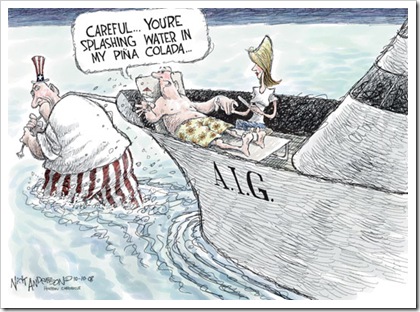 In a press release today, it was announced that the Oversight Committee has requested a detailed listing of all conferences, events, or retreats paid for by AIG this year, as well as bonuses paid to AIG executives. In the 3 page letter, which was addressed to Liddy, the current CEO of AIG, Chairman Waxman requests "additional information and documents as part of the Oversight Committee's investigation" into AIG. AIG's response? Well none yet, but they want another $10 billion dollars already on top of the $122.8 they have.
In a press release today, it was announced that the Oversight Committee has requested a detailed listing of all conferences, events, or retreats paid for by AIG this year, as well as bonuses paid to AIG executives. In the 3 page letter, which was addressed to Liddy, the current CEO of AIG, Chairman Waxman requests "additional information and documents as part of the Oversight Committee's investigation" into AIG. AIG's response? Well none yet, but they want another $10 billion dollars already on top of the $122.8 they have.


